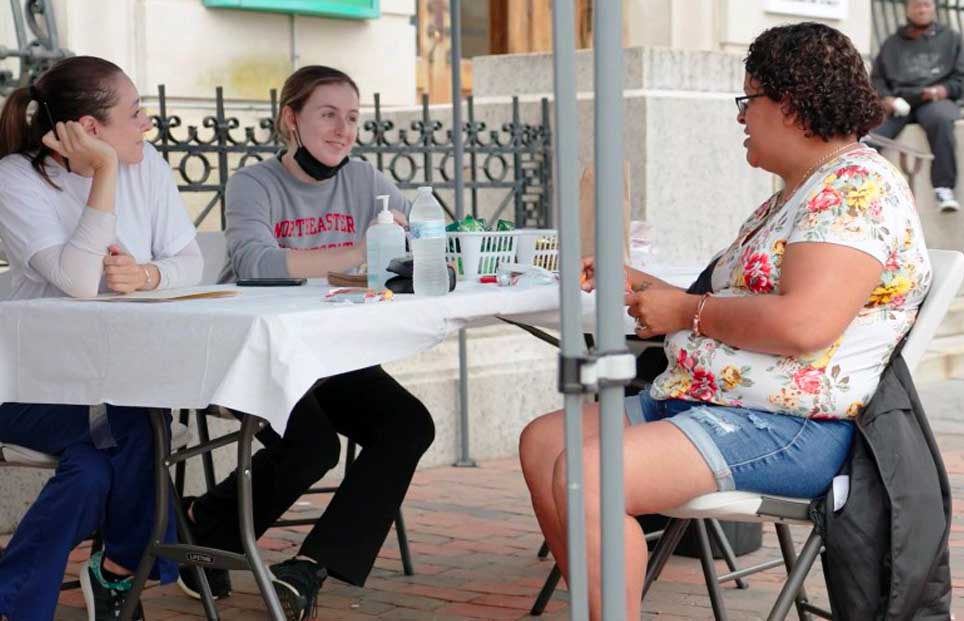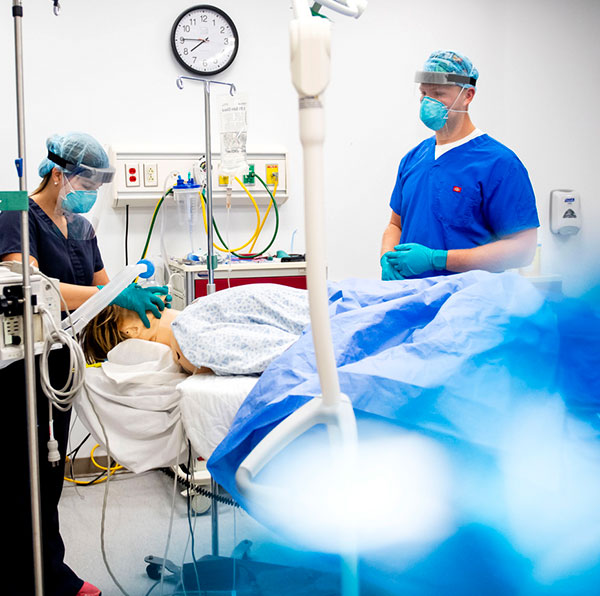redefining what’s possible

Our innovative nursing program combines foundational practices, clinical experiences, and real-world simulations to prepare students for a successful patient care career. Our educators and mentors come from some of the country’s world’s finest health facilities such as Boston Children’s, Mass General, Tufts Medical, and Brigham and Women’s, and many other top-rated hospitals.
In addition to our robust clinical opportunities, our world-renowned co-op program offers collaborative learning opportunities that prepare students by deepening their learning and applying themselves as nurses in the 21st century.
Students with no previous degrees or college courses should apply through Northeastern’s undergraduate application process. Students who already have a baccalaureate degree in a field other than nursing can extend and strengthen their education through our Direct Entry Nursing Program or Accelerated BSN programs.


The undergraduate nursing curriculum is designed to give students the knowledge, skills, and professional values that will put you in position to lead the future of healthcare. The curriculum draws on basic and behavioral sciences, the arts and humanities, and the art and science of nursing to help you understand the complexities of health and illness across the life span.
The skills and procedures you learn in the nursing courses prepare you for the clinical courses to come. You will build confidence as you put your nursing skills into practice caring for patients during academic and co-op experiences.

The prelicensure programs at the Northeastern University School of Nursing are approved by the Massachusetts Board of Registration in Nursing.
Below is a sample curriculum showing a track in which a student completes two co-ops and graduates in four years. Students work with their advisors to determine a schedule that puts them on the path to graduation.
Students with no previous degrees or college courses should apply through Northeastern’s undergraduate application process. Instructions for how to apply and next steps can be found on Northeastern’s How to Apply page. Note that there is no separate application process or supplements required for the Nursing Program. Students are admitted directly into the Nursing Program.
Transfer students must start in the fall. To be accepted into the program, transfer students must also have an overall QPA of 3.0 and have successfully completed the following courses:
Microbiology is recommended. Additional non-nursing courses applicable to the curriculum may be transferred into the school.
To learn more about the transfer process, visit Northeastern’s Transfer Applicants page.
Students who already have a baccalaureate degree in a field other than nursing have two different program options:
The Direct Entry Nursing program offers the opportunity to become a master’s-prepared nurse in the specialization of your choice. Sixteen months of nursing-specific classes (including practica) prepare students to sit for the national licensing examination (NCLEX). After passing the NCLEX and working as a registered nurse, students continue in the master’s program.
The Accelerated BSN programs in Burlington, MA, and Charlotte, NC, allow undergrads with a non-nursing background the opportunity to fast-track into the nursing field.



Learning extends beyond the classroom at Northeastern. Providing students with opportunities for thought-provoking experiential education that links coursework with the real world is central to the mission both of the University and Bouvé College of Health Sciences.
Our broad mix of experience-based programs — including co-op, student research, service learning, and global learning — build deep and lasting connections that enable Bouvé students to transform their lives, giving them valuable opportunities to practice their profession as members of a healthcare team. The co-op program provides students the opportunity to explore or refine potential career paths, make valuable industry connections, broaden perspectives, and acquire the skills and knowledge needed to succeed via a six-month placement with a company or organization in their field of interest, during which they work as a full-time employee.
The Bouvé College of Health Sciences School of Nursing has an extensive network of top-notch clinical affiliations at health centers, major teaching and community hospitals, and clinics that allow students to engage in clinical experiences covering a wide range of nursing specialties. These include:
Students have the option to select either the 4 year program with 2 six-month co-ops, or the 5 year program with 3 six-month co-ops.
All nursing students take the same courses, regardless of which option they select. However, students who complete the 4 year option may need to either use advanced placement credit or take courses on co-op to complete credit requirements for some electives.
Students have until September 1st of the third year of study to make the decision regarding whether they will graduate in 4 or 5 years. You also have the option to make that decision earlier in the program, if they would prefer.
Co-op are 6 months in length. Spring/Summer I co-op schedule is from January to June and the Summer II/Fall co-op schedule is from July to December. This is the same co-op schedule that most undergraduate programs in the university follow.
If you, as a student, live in a residence hall and accept a local position, you can continue living in the residence hall. If you accept a position outside the Boston area, your housing deposit can be transferred to another semester.
Yes! Nursing students have access to international co-op opportunities and Dialogues of Civilization programs, just like all students at the university.